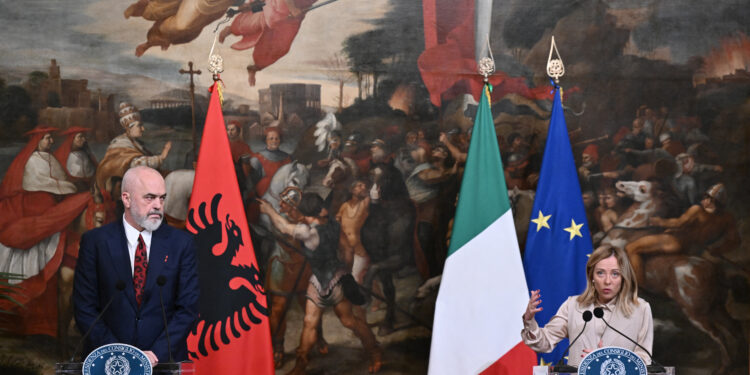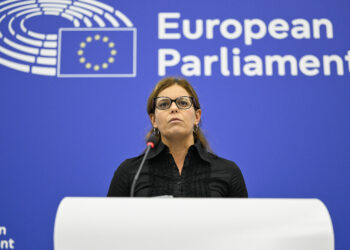Brussels – The debate on European migration policy, especially the returns issue, remains undoubtedly hot after the leaders of the 27 member states concluded at the last summit to explore “innovative solutions” to combat irregular immigration. The now-infamous agreement between Italy and Albania that PM Giorgia Meloni (and liked in Brussels) sponsored to outsource asylum procedures has come under the crossfire of the progressive groups in the Strasbourg hemicycle. According to the Socialists, it represents a violation of EU and international law; for the Liberals, it is an expensive and ineffective model; for the Greens, it is a Guantanamo-style concentration camp.
Repatriations defended by right-wingers
Reacting to the intervention of Equality Commissioner Helena Dalli, who defended the EU executive’s positions on the new Pact on Migration and Asylum (expressed directly by President Ursula von der Leyen on the eve of the last summit in a letter to chancelleries), members of the political groups in the House had their say on the most controversial issue of the new approach Brussels seems intent on following to manage irregular migration flows.
Namely, returns of rejected asylum seekers: “We need to put in place a common European return system. To do so, we need a new modern regulatory framework,” Dalli said, stressing that the reform of the directive on the issue (which dates back to 2008) has been stalled since 2018. Therefore, the Commission will soon make a new legislative proposal “to make returns more effective while protecting the fundamental rights and dignity of those subject to a return procedure.” A stance defended by her European People’s Party (EPP), which, with Tomas Tobé, stresses that “we must reclaim control of migration” at the EU level since “we, and not the traffickers, have to decide who can enter Europe.”
The radical right groups also support the need to outsource repatriation procedures signaled by the Christian Democrats. European Conservatives and Reformists (ECR) co-leader Nicola Procaccini stated that the EU should not let in “just anyone, but only those persecuted and whom we can welcome with dignity, with the possibility of integration.” To ensure that this happens, the Meloni party MEP explained, it is necessary to “deal with the migratory phenomenon before it arrives on European territory,” adopting an approach like the one followed by the Italian premier with the CPRs in Albania. Outsourcing “is already in the new pact,” he added. For this exact reason, the latter “can be considered a first small step in the right direction.” The head of the League delegation in Strasbourg, Paolo Borchia, agrees and says the “Illusion that Europe has unlimited opportunities and possibilities for reception must be eliminated.”
Leftists, liberals, and Greens are on the barricades
Socialist (S&D) group leader Iratxe García Pérez lashed out precisely against the axis that the Populars seem intent on forming with the far right, pointing the finger at von der Leyen’s “letter of shame” which must not be allowed to “bury” the Migration Pact. “The only charter to which we are bound is the Charter of Fundamental Rights of the European Union, a charter that guarantees the right to asylum and prohibits collective expulsions and indiscriminate deportations,” which “represent the most unworthy application of the values of the European project,” she said.
Then the lunge against the openness of Brussels and other capitals against the pact between Rome and Tirana: “Now that the Italian justice established that the Meloni government’s agreement with Albania is illegal, Ms. von der Leyen must abandon her inhumane and illegal proposal to create deportation centers in third countries.” Pérez said, adding that “it is unacceptable to kneel before the extreme right, to bless a migration model that violates human rights” and which, moreover, the EU Commission itself deemed illegal until a few years ago.
A “model of how not to do things,” echoed Cecilia Strada (PD), according to whom “the center in Albania is a logistical nightmare and a legal disaster because it does not comply with international conventions and EU legislation” and is “a serious threat to human rights” as well as “a rather significant economic damage,” referring to the massive costs incurred by the state to relocate asylum seekers and, shortly after, even to bring them back.
Liberal group leader (Renew Europe) Valérie Hayer also insisted on the cost-efficiency nexus of Italian hotspots across the Adriatic Sea: “In addition to the cost of living crisis, today there is also the cost of populism,” she said in the House, arguing that managing asylum seekers in CPRs in Albania requires “an astronomical sum, at taxpayer expense: how can anyone want to be inspired by such a failure?” “The transfers to Albania, which held up for only a few hours, are an example of maladministration” that “not only do they not respect our values, they do not even work,” the French MEP said.
Ilaria Salis, elected with AVS in the ranks of The Left and currently amid a political-judicial storm concerning her parliamentary immunity contested by Hungary, defined the deal with Albania as a “shameful operation of colonial memory” through which “the Italian government became the vanguard of a European attack against migration and law.” According to Salis, “the attempt, so far unsuccessful, to outsource detention in a concentration camp on foreign soil and to speed up the procedures for the assessment and repatriation of migrants represents cruel suffering and humiliation for people deported on the high seas, treated as expendable humanity.” This is “evidence of absolute incompetence” on the part of Italian authorities and “a creepy right-wing forcing of international law, which protects the rights of people on the move,” she added.
On a similar note, shortly after, Ignazio Marino, also elected with AVS but a member of the Greens (Greens/EFA) group in Strasbourg, said the CPR in Albania is “a lager outside European borders,” the recent precedent of which would be the Guantanamo prison camp built by the United States in Cuba, where internees are “treated outside the law.” “However, in the case of Guantanamo, we are talking about terrorism suspects,” while “here we are talking about the ‘holistic’ treatment of desperate people,” he added, mocking the title of the debate (which mentioned a ‘holistic path’ to an effective European policy on repatriation).
Another Italian environmentalist, Leoluca Orlando, said in a note that “deportation agreements and detention centers abroad are an inhumane, costly, and ineffective response to a complex situation,” as demonstrated by the Rome court ruling, which highlighted “the numerous human rights issues that these agreements present.” “The outsourcing of migration ignores the EU’s legal obligation to guarantee access to asylum on its own territory and is neither practical, ethical, nor cost-effective,” continues the statement, which also reserves a jab at the EU executive: “The Commission is the guardian of the Treaties and must adhere to and promote the rule of law, not ignore it to please populists. President von der Leyen should condemn far-right policies, not consider them serious options.”
English version by the Translation Service of Withub



![La presidente del Consiglio, Giorgia Meloni (a sinistra) con i leader di Danimarca e Cipro in un momento che precede i lavori del vertice dei capi di Stato e di governo dell'Ue [Bruxelles, 17 ottobre 2024. Foto: European Council]](https://staging.eunews.it/wp-content/uploads/2024/10/meloni-241017-350x250.jpg)




